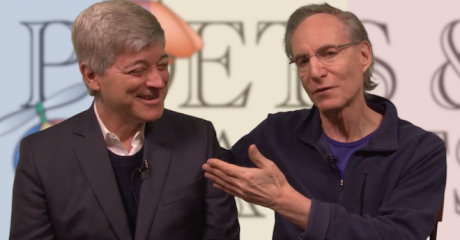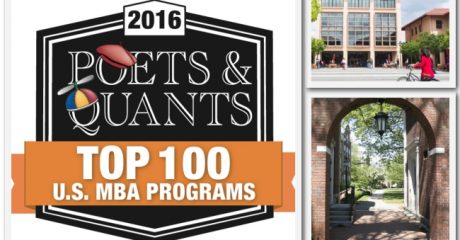The profile was last updated on September 1, 2017. If you have any questions, please contact our general manager.
Admission Deadlines:
Round 1: October 23rd, 2017
Round 2: January 8th, 2018*
Round 3: March 5th, 2018
Round 4: April 30th, 2018
*Priority consideration for Scholars Day and Diversity Scholarship is given if application is made by Round 2.
Shortly after M. Eric Johnson became dean of Vanderbilt University’s Owen Graduate School of Management in 2013, he hired Huron Consulting Group to guide the strategic study of the school and its positioning in the marketplace. They surveyed more than 1,400 alumni from class years 2006 to 2012 as well as MBA recruiters on their needs and views of Owen MBAs. He liked what he heard from employers. Owen MBAs, they told the consultants, are “every bit as sharp as the Wharton and Booth kids without the attitude.”
This time, however, the research didn’t urge a dramatic upheaval at all but rather a reaffirmation of the school’s size and culture. “The key ah-ha was that for much of the school’s life, it was often trying to create something different and special,” explains Johnson. “But we are like the Boston Pops. We are 50 faculty and we will never be 200. So how do we compete in a world where we will never rival Northwestern in marketing or Wharton in finance?”
The conclusion: To double-down on what makes the school already distinctive. “What makes us unique is our culture and our size so the bottom line is to stop looking longingly at Northwestern hoping that we can beat them at marketing. It’s about creating unique, personalized experiences that students can’t get elsewhere.”
The strategic study found that alumni and employers identified the school’s five core strengths as its highly collaborative and positive student culture, its small learning environment, the strength and quality of its alumni network, the authenticity of its students who are described as genuine teamplayers who are “curious, bright and a little bit scrappier,” and finally, Owen’s location in Nashville, a highly livable and vibrant city.
To Johnson, doubling down on these attributes largely means staying small, creating a nearly customized MBA experience filled with more s0-called “immersive experiences” and leveraging the school’s location in Nashville. “We really are taking this personal scale idea across everything we do,” he says. “The faculty started looking at the things we do and came up with a number of new ideas.” One example: An entrepreneurship immersion in conjunction with Nashville’s thriving new Entrepreneurship Center.
Vanderbilt’s MBA is based on a modular system of intensive courses, each seven weeks in length. Two “mods” equal one semester. Mods give students a fast start by allowing MBA candidates to take courses in a chosen specialty as early as Mod 2 of the first year, giving Owen MBAs a leg up on some rival schools for summer internships.
During the first year, Owen requires 11 core courses of its MBA students, the majority of which are taken during the first two mods. As in most MBA programs, there’s plenty of opportunity to customize the degree to one’s career goals. Each student has to complete at least one concentration, which consists of 12 hours in a single discipline beyond the core. Students interested in a “deeper dive” into a discipline may choose to pursue a career-focused specialization of 20 credit hours.
As part of the required core, faculty place ethics in a larger framework, teaching critical strategies to protect and practice integrity in the workplace. In addition, Vanderbilt students are bound by the Honor System, which was inaugurated when the university opened its doors in 1875. All students are required to read and sign the Honor Constitution of the Owen Graduate School of Management. All students take Business Ethics in either Mod 1 or Mod 2 of second year in program.
Full-time Vanderbilt MBA students may take courses for credit at other Vanderbilt graduate schools with approval. Many students choose to take interdisciplinary classes at the Law School, Divinity School, Peabody School of Education, Medical School and the Nursing School. Students generally choose to take these classes during their second year. Popular options are language courses.
Rankings Analysis:
One thing that stands out about Owen’s MBA rankings in recent years is that the school has consistently angled its way into the Top 25 list of U.S. business schools. Sure, there are some ups and downs in the data, something that you’ll find for just about every ranked school. But Vandy has placed 25th in three of the past six years of Poets&Quants’ annual rankings, with a best showing in 2012 at 23rd and its weakest showing in 2015 at 29. The P&Q ranking is the best bellwether of a school’s rankings performance because it is a composite list based on the five most influential business school rankings in the world.
Out of those rankings, Vandy has done exceptionally well with The Economist and U.S. News. In U.S. News, arguably the most watched ranking in the U.S. marketplace, Vandy has risen to a rank of 22 in 2016, a jump of five places from a year earlier, and from 36 in 2010. In The Economist’s global MBA ranking in 2015, where Vandy competes with schools from all over the world, Owen rose to a rank of 23 in 2015 from 46 in 2010–a 23-spot increase.
The school has done less well in Forbes’ biennial return-on-investment ranking, slipping to a rank of 39 in 2015 from 30 in 2010, and in the now unpredictable ranking published by Bloomberg Businessweek. In the 2015 BW ranking, Owen placed 29th in 2015, down from 25 a year earlier. Owen also lost ground in the Financial Times, tumbling 10 places in 2016 to a rank of 71 in a four-way tie with the full-time MBA programs at Boston University, the University of Minnesota, and the Georgia Institute of Technology.
This is a school that pays attention to the rankings. After a disappointment performance in Businessweek’s 2010 survey, for example, when the school fell to a rank of 37 from 30 in 2008, some serious soul searching occurred. Owen ultimately reduced enrollment, beefed up scholarship aid and went about significantly improving the quality of its students.













